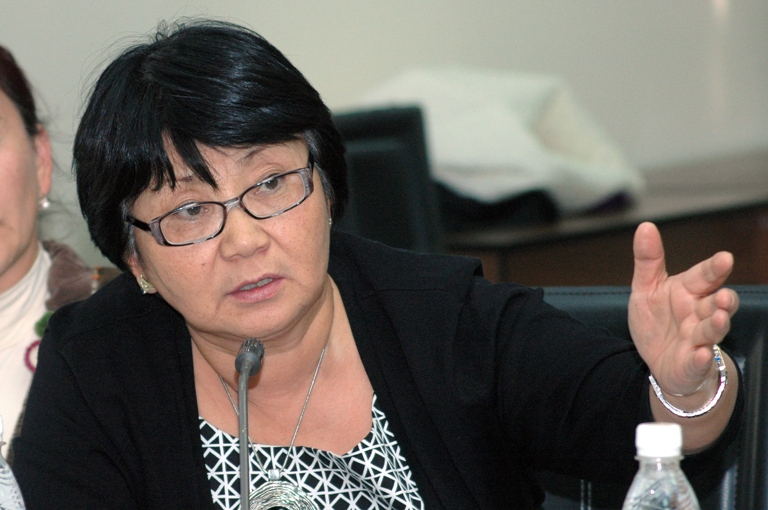
Divided Government Plagues Otunbayeva
Publication: Eurasia Daily Monitor Volume: 7 Issue: 103
By:

The only female leader in Central Asia, Roza Otunbayeva, seems to be unable to reign in the activity of her government, which predominantly consists of male leaders. Most of them are infamous for involvement in corruption and endless political ambition. Recordings of phone conversations which were recently leaked on the internet show that several members of the provisional government are engaged in large-scale corruption. Just a month after gaining power as a result of a violent ouster of the regime of former president Kurmanbek Bakiyev, the Kyrgyz government is divided, and its major leaders are engaged in backstabbing and blackmailing.
Otunbayeva enjoys support of many in Bishkek. However, most believe she will not be able to retain her leadership beyond the next presidential elections scheduled in October 2010. Most of the decisions made by the leaders of the provisional government are made without Otunbayeva’s knowledge. She often plays the role of mediator or attempts to play a reconciliatory role for competing interests. She is by far the only leader of the government whose political background is not marred by allegations of corruption. With the exception of the Baltic states, Otunbayeva is also the first and only female president in the post-Soviet space.
By contrast, most leaders of the provisional government lack the support of the broader population. Their popularity has dramatically declined over the past five years when they were unable to present a formidable challenge to Bakiyev. However, at the same time leaders like Almazbek Atambayev—who is responsible for economic policies in the provisional government—prefer to collaborate with Bakiyev in order to secure seats in the parliament, but at the expense of other opposition parties like Ata Meken, led by Omurbek Tekebayev.
Overall, Atambayev and General Prosecutor Azimbek Beknazarov are the most divisive figures inside the government. Both are actively separated into dividing offices shortly after gaining power. Atambayev has been launching personal attacks against some members of the government, including Temir Sariyev and Beknazarov. His assail against Beknazarov in particular suggests that he wants to see the general prosecutor leave the government.
Beknazarov and Atambayev recently exchanged personal attacks during a recorded phone conversation that was posted on YouTube. “Hey, my friend, you know that I can arrange a third revolution if the need comes”, said the voice of Beknazarov. “Why don’t you scare someone else but me!” responded Atambayev. The politicians discuss $400,000 bribe allegedly paid for a prestigious government position (www.24.kg, May 21).
Otunbayeva is likely to face strong opposition from among the current members of her government already in the October parliamentary elections. Atambayev or Beknazarov might be the first ones to join the opposition and try to challenge the provisional government. Atambayev has announced that he is not planning to run in the upcoming parliamentary and presidential elections because his life is in danger. The Kyrgyz media alleges that Atambayev appears to be seeking the position of prime minister (www.akipress.kg, May 25). Otunbayeva withdrew from the Social Democratic Party led by Atambayev, in an effort to distance herself from him.
Members of the provisional government admit that internal divisions negatively impact the economic and political climate in the country (www.atameken.kg, May 25). While the government members are busy sorting out relationships among themselves, Bishkek continues to be plagued by continuous riots mostly in support of various political figures who are not part of the provisional government. The provisional government has more opponents than supporters among the various civil society groups based in Kyrgyzstan.
Several young and aspiring politicians see the overall fatigue with the current leaders as an opportunity. “A third force, previously unknown to the wider public, is likely to emerge prior to parliamentary elections”, says one local entrepreneur, who is himself considering participating in the parliamentary elections. Members of Bakiyev’s opposition and the leaders of youth organizations so far have remained quiet but are planning to increase their activity as elections approach.
Meanwhile, the Kyrgyz media continues to closely observe plans by the U.S. Department of Defense to renew its fuel contracts with the Mina Corporation, a company previously suspected of collaborating with members of the Bakiyev family. The way Otunbayeva’s government builds its relations with U.S. contractors delivering fuel to the U.S. Transit Center at Manas will be yet another test of her government’s willingness to fight corruption left by the previous regime. Given that Otunbayeva’s government continues to be bitterly divided only a few weeks into its leadership, and the fact that old corruption schemes are possibly being reinvented under her leadership, does not promise a smooth period of transition for the provisional government in the weeks ahead.




